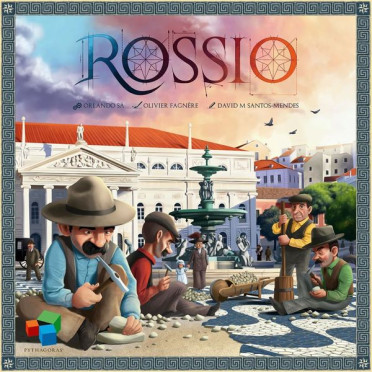Simple rules and great interaction between players!
The King of Portugal called upon the best stonemasons in the country to pave one of the most important squares with calçada tiles (world-renowned black and white tiles that pave many squares in Portugal). But the task is enormous and players will have to count with the help of cards, which will make them score points and/or collect money.
In Rossio, players start the game by drawing five cards and keeping three.
In turn, the player will first recruit with a card from his or her hand, placing it on the rightmost square underneath the game board, dragging to the left all previously recruited cards. If the newly recruited card is played face up, players must pay its cost in pieces. If the card is played face down, there is no money to spend.
Next, all cards under a player's board will activate: the face-up cards will give the player points for each pattern represented on the card that is also on the square. The face down cards will give the player 1 piece each.
Next, players must build the left-most calçada tile on their board.
Players can never voluntarily change the order of the tiles on their board. At any time, however, players may spend 1 piece to exchange 2 pieces on their board that are orthogonally adjacent. The tile must be built in the square orthogonally adjacent to at least 2 elements: 1 tile and 1 wall, or 2 tiles. And must be built on the leftmost available space to the left of the line where it is built. If players manage to build orthogonally next to a similar tile, they can build the next left-most tile as an added bonus, and so on, until they decide to stop or until they can't build any more.
Players then collect 1 piece for every piece shown on the squares that remained free on their board after the tiles were built.
Finally, players end their turn by drawing 1 card from the 4 cards available on the market. However, the number of cards players can choose depends on the number of tiles they have built. Thus, if players build only one tile, they must take the 1st card. If they build 3 tiles, for example, they can choose between the 1st, 2nd or 3rd card.
Players end their turn by filling in the empty spaces on their game board with the tiles from the upside down piles.
As the construction progresses, some patterns appear more often than others and the score of the face-down cards becomes exponential. In addition, when players complete a column, they receive a bonus, which can be either a coin or the drawing of several cards.
Money is very scarce in this game, so winning an extra coin can be crucial in recruiting a card from your face-up hand.
The game ends when the board is finished and the player with the most points wins the game.
Rossio is all about timing: Recruit a face-up card late in the game, and it will score fewer points than expected. Recruit a card too early and it will score a few points because there are few tiles on the square. Too many cards recruited face down will give you that extra amount, but they will not score any points. Build several tiles and you will probably help your opponents. Build fewer tiles and you probably won't have money in the next round to recruit a face-down card...
| Theme(s) | Construction | |
| Language(s) | Anglais, Espagnol, Portugais, Allemand | |
| Mechanism(s) | Construction, Modular, Majority, Tiles | |
| Author(s) | Orlando Sá | |
| Artist | Olivier Fagnère | |
| Editor | Pythagoras |
Soyez le premier à commenter ce jeu
Vous devez être identifié pour soumettre des avis.
Copyright © 2024 www.philibertnet.com Legals - Privacy Policy - Cookie Policy - Sitemap






